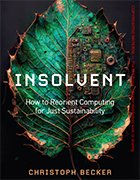Toward justice and sustainability in the tech industry
In this excerpt from his book 'Insolvent,' author and professor Christoph Becker outlines why and how to reorient the tech sector toward social justice and sustainability.
"Technologies are social, and modern societies are technological," writes Christoph Becker in the first chapter of Insolvent: How to Reorient Computing for Just Sustainability.
Throughout the book, Becker, a professor at the Faculty of Information and director of the Digital Curation Institute at the University of Toronto, explores the fundamental and conflicted role that technology plays in modern life. In light of technology's impacts on the planet and on society, environmental sustainability and social justice concerns can't be ignored when designing IT systems; rather, he writes, such considerations should be central.
In the below excerpt from Insolvent, a recent release from MIT Press, Becker argues that the field of computing is stuck in a series of foundational myths -- for example, that technology is politically neutral. These myths stand in the way of progress on environmental and social justice, and undoing them will be key to charting a new path for sustainable systems design in the tech sector.
For an in-depth exploration of technology's relationship to sustainability and social justice, check out the rest of Insolvent. And for more from Becker, read his interview with TechTarget Editorial, where he discusses how tech workers can start conversations about sustainability, ways to combat climate crisis fatigue and more.
The deep entanglement of IT with our societies has raised high hopes for a transition to more sustainable and just societies. In principle, computing can be key to environmental sustainability and social justice. It can enable open information access, support sustainable lifestyles, drive the dematerialization of goods and services, and support the partial decoupling of value creation from material resource consumption. But in practice, the opposite is more common. Everywhere on this planet, computational systems drive environmental damage, increase the demand for resource extraction, reinforce inequality and injustice, and enable the erosion of privacy and democratic governance. This is especially true for those systems that are touted as success stories.
The computational systems we live with today often advance economic objectives at the expense of social and environmental considerations. Those we design tomorrow must advance social and environmental values simultaneously with technical and economic objectives. This fact has prompted many in computing to work on designing for sustainability and to tackle questions of justice and fairness in computing. But their good intentions have not changed the trajectory of computing. On the contrary: the rising tide of reports about the harmful implications of computing indicate that its debts are mounting. But these debts are treated as what economists call externalities -- they are outsourced, offshored, foisted on those distant from the design processes. From designed obsolescence to excessive energy consumption, from racist algorithms to the indirect implications of platform economies and surveillance capitalism, the choices made in the design and development of computational systems have implications at farther distances than ever before.
These choices come in many forms. I use the term systems design to refer to the broad set of intentional activities that directly or indirectly shape computational systems. This encompasses activities such as software development that are often seen as "technical," and activities such as the facilitation of workshops with stakeholders that are often seen as "social." This simplistic distinction between technical and social hides that most systems design activities are simultaneously social and technical because they explicitly or implicitly reconcile social aspirations, expectations, needs, and concerns with technical constraints and material conditions. This is openly acknowledged in areas such as user interface design, architectural design, requirements engineering, or project management. Because of its wide sociotechnical spectrum, systems design is taught and practiced in a range of disciplines including human-computer interaction (HCI) and software engineering by many stakeholders, not all of whom consider themselves computing professionals.
The social and temporal distance between design choices and their outcomes entails uncertainty, ambiguity, and what moral philosopher Gardiner (2014) terms asymmetric vulnerability: those affected by technology development and design decisions have little means of influencing the outcomes -- in the case of future stakeholders, none at all. One might say that these stakeholders carry the debts of computing: the wide-ranging ways in which the outcomes of systems design weigh on our planet and its societies.
Once we account for these debts, the question is whether computing can pay them back or whether we should consider it insolvent. As the title suggests, I will argue that in its current form, computing is indeed insolvent: It is incapable of paying back the debts it owes to this planet and its societies. It is so stuck in its ways of thinking that, to make progress, we need to rethink and restructure it.
This book will start from the premise that the rise of computing's debts is shaped by the ways of thinking that dominate it. This book's central argument is that computing can only pay them back and become a force for sustainability and justice once we rewrite central narratives of systems design. Three ideas in particular have shaped the discourse of computing like a river's undercurrents -- that algorithms and computational systems are politically neutral tools; that problems and requirements are objectively given facts; and that the individuals and teams who design and develop computational systems are rational agents whose reasoning processes are admittedly flawed and biased and incomplete but, nevertheless, best described and approximated using the computational metaphor of information processing. The modern ideas of technological neutrality, scientific objectivity, and rational decision-making have played central roles in shaping the self-understanding of computing throughout the past seven decades, even though their validity and footing vary across the range of fields and perspectives in computing. In systems design practice and research, these ideas manifest as myths -- "foundational narratives that are ritualistically circulated within groups to reinforce collective beliefs" (Ames 2019, 18) -- when their limited scope is over-extended into a context in which their validity is not empirically or theoretically supported. Together, these myths drive a narrow focus that views design as using computational tools to solve problems described by scientific reasoning, based on the assumption that the resulting technology is value neutral. This narrow ideology is stuck. To overcome its impasse, we need to rewrite the narratives it is built on.
This book examines the role and validity of the myths of computing in order to reorient systems design practice and theory in computing toward the values of sustainability and justice. My aim is to illustrate how these ideas manifest in systems design as myths; to demonstrate how the myths interact to produce misleading beliefs about the nature and implications of systems design practice; to show how these misleading beliefs prevent meaningful engagement with the challenging questions raised by social justice and sustainability; and on that basis, to develop concrete steps to reorient systems design practice, research, and education.
In other words, to genuinely progress toward sustainability and justice, we need to combine the conversation about how computing shapes our lives with a close and critical look at how it comes to life -- how we design computational systems and how we should design them.
References
Ames, Morgan G. 2019. The Charisma Machine: The Life, Death, and Legacy of One Laptop Per Child. Cambridge, MA: MIT Press.
Gardiner, Stephen M. 2014. A Perfect Storm: The Ethical Tragedy of Climate Change. Cary, UK: Oxford University Press.







